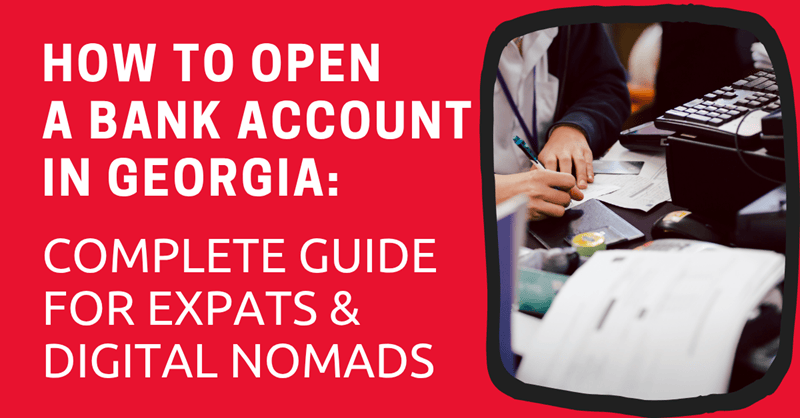
This article will take approximately 21 minutes to read. Don't have the time right now? No worries. Email the ad-free version of the article to yourself and read it later!
“Learn how to open a Georgian bank account in 2025. Step-by-step guide covering required documents, best banks (TBC, BoG), fees, and expert tips for expats”
“Should I open a bank account?” It’s one of the most common questions among digital nomads thinking about moving to Georgia.
Back in 2018, when I first came here as a digital nomad, hardly anyone considered it. Most people saw it as unnecessary and not worth the hassle. Some even assumed it would involve Kafkaesque bureaucracy or some kind of leftover Soviet-style nightmare.
But times have changed. As Georgia has grown more popular with long-term nomads, remote workers, and retirees, opening a local bank account has become more common, and more useful. While you can still live in Georgia without one, having a local account makes life here a lot easier.
In this article, I’ll walk you through everything you need to know about opening a bank account in Georgia, whether you’re staying short term or planning to settle down. I’ll cover who’s eligible, what documents you need, which banks are easiest to work with, what to watch out for, and share a few tips based on my own experience and advice from other expats who’ve done it recently.
Disclaimer: This article may include links to products or services offered by ExpatDen's partners, which give us commissions when you click on them. Although this may influence how they appear in the text, we only recommend solutions that we would use in your situation. Read more in our Advertising Disclosure.
Contents
- 4 Key Benefits of Having a Georgian Bank Account
- Types of Accounts in Georgia
- Step-by-Step Account Opening Process
- Minimum Deposit Requirements
- Best Banks for Expats in Georgia
- Georgian Banks Comparison
- Where to Find Banks
- Opening Hours
- Maintaining the Bank Account
- ATM Card
- Online Banking
- Paying for things in Georgia
- Bank Fees to Be Aware Of
- Is It Easy to Open a Bank Account in Georgia?
- Should I Open a Georgian Bank Account If I’m Only Staying Temporarily?
- 4 Extra Tips to Successfully Open a Bank Account in Georgia
- Frequently Asked Questions
- Can tourists open bank accounts in Georgia?
- How long does it take to get a Georgian bank card?
- Do I need to speak Georgian to open an account?
- Can I open a Georgian bank account online?
- What documents do I need to open a bank account?
- Is there a minimum deposit requirement?
- Are there maintenance or monthly fees?
- What currencies can I open my account in?
- Can foreigners apply for loans or credit cards?
- Can I link my Georgian bank account to Wise or Revolut?
4 Key Benefits of Having a Georgian Bank Account
To help you decide whether or not to open a bank account in Georgia, let’s look at the main reasons why expats, digital nomads, entrepreneurs, and retirees in Georgia choose to have one:
Multi-currency Accounts
This is one of the most popular reasons right now. Georgia is becoming a hub for entrepreneurs and digital nomads because of its favorable tax system. You can easily open a multi-currency account in GEL, USD, and EUR. This is especially useful if you need to handle international transactions or hold foreign income. You can also link your Georgian account with services like Wise to receive or transfer money internationally with very low fees.
Pay for Things in Georgia
Many essential payments, like rent and utility bills, are easier and cheaper to make using a local bank account in Georgian Lari. It’s simply more convenient for day-to-day living.
Receive Salary or Business Payments
If you work for an international employer based in Georgia or run a local business, a Georgian bank account is usually necessary to receive payments or salary.
Withdraw Cash in Georgian Lari
While Georgia is moving toward being more cashless, you’ll still need cash from time to time, especially in rural areas. You can use a Wise card to withdraw from ATMs, but the fees are typically lower when using a Georgian bank account.

Types of Accounts in Georgia
Opening a bank account in Georgia is quite similar to what you’d expect in most countries. Here are the main types of accounts available:
Personal Accounts
These are the most common for individuals and can be opened at any major bank in Georgia, such as Bank of Georgia, TBC, or Liberty Bank. Personal accounts typically include:
- Current Account (Checking Account)
Used for everyday transactions like paying bills, shopping, or withdrawing cash. While it’s called a “checking” account, nobody actually uses checks in Georgia. - Savings Account
Designed for saving money with interest. However, interest rates in Georgia tend to be slightly lower than in some other European countries.
Business Accounts
These accounts are for companies, entrepreneurs, and organizations. Most freelancers don’t need one, unless they’ve registered a business entity like an Individual Entrepreneur (IE) or LLC.
Be aware: many foreigners report that opening a business account can be more bureaucratic. Some applications are denied without clear explanation. Banks often require a business plan and additional documentation.
Multi-Currency Accounts
This is another popular option. Most major Georgian banks offer accounts in multiple currencies, including GEL, USD, and EUR. This is especially useful if you do international business, earn income in foreign currencies, or travel often.
Step-by-Step Account Opening Process
Here’s a step-by-step guide to opening a bank account in Georgia. The process is generally quick and straightforward.
Step 1: Choose a Bank
Start by selecting the bank you want to open an account with. The top two options are Bank of Georgia and TBC Bank. Both have wide networks of branches and ATMs across the country and offer excellent mobile banking services.
It’s best to choose a branch in a central area, such as downtown Tbilisi or Batumi. These locations tend to have more experienced staff who speak English and are familiar with helping foreigners. They’re also less likely to request extra documents or make up unnecessary requirements.
Step 2: Prepare Necessary Document
The required documents can vary depending on the bank, and sometimes even on the person handling your application.
Typically, you’ll need:
- Your passport
- A completed application form
- A copy of your signature
Some banks may also ask for your address. It doesn’t always have to be a Georgian address, and while some applicants are asked to provide proof of it, many are not. In some cases, they might also ask for proof of income, but this depends on the branch and the staff.
Tip: Always confirm the fees and requirements with the bank you’re considering.
Step 3: Visit a Branch to Open an Account
When you visit a branch, simply tell the staff that you’d like to open a bank account. If you’re at a branch in a central or downtown area, the staff will likely speak English. If not, try approaching a younger staff member. They’re more likely to speak English and be familiar with the process.
You’ll need to fill out one or two forms provided by the bank. In most cases, your application will be approved on the spot.
You’ll usually receive your IBAN the same day. Your debit card will typically arrive within a few days. Online banking access is available immediately after your account is set up.
Minimum Deposit Requirements
Most banks don’t have a strict minimum deposit requirement. Some, like TBC Bank, don’t require any minimum deposit at all. You can open an account with as little as 1 GEL.
That said, depending on the bank, there’s usually an account opening fee ranging from 20 to 50 GEL.
Good to know: It’s not uncommon for staff, especially those unfamiliar with foreign clients, to quote an arbitrary minimum deposit, sometimes as high as 100 or even 500 GEL. In most cases, this is either negotiable or simply incorrect. Central branches in major cities tend to stick more closely to the official policy and are less likely to add unnecessary requirements.
Best Banks for Expats in Georgia
The top two Georgian banks for digital nomads are Bank of Georgia and TBC Bank. They’re fairly equal in terms of service and popularity. Most feedback, whether positive or negative, often depends more on the specific branch or staff you deal with than the bank itself.
That said, here’s a quick breakdown of the main options:
Bank of Georgia (BoG)

Bank of Georgia (BoG) is the largest and one of the most established banks in the country, with branch locations across Georgia. The mobile app is user-friendly. It’s the “tried and true” option for many expats and locals alike.
TBC Bank

TBC Bank is my personal favorite, thanks to its strong digital services. The website is easy to navigate, and the mobile app is reliable. TBC is often considered slightly more modern and expat-friendly, especially when it comes to online banking.
Liberty Bank

Liberty Bank is known for offering low-cost personal accounts with more affordable fees. However, its online services are more limited compared to BoG and TBC.
Credo Bank

Credo Bank is a smaller bank that’s becoming more popular among expats, especially on Facebook and Reddit. You can reportedly open a multicurrency account in just 25 minutes. That said, ATM access is more limited, and the mobile app can be a bit inconsistent.
Georgian Banks Comparison
Here’s a quick comparison table of banks in Georgia to help you decide which one fits your needs best:
| Bank | ATM Access | Mobile Banking | English Support | Best For |
| TBC Bank | Nationwide | Modern, reliable, user-friendly | Good in main cities | Everyone |
| Bank of Georgia | Nationwide | Easy to use, well-supported | Good in main cities | Everyone |
| Liberty Bank | Good in both cities and rural areas | Basic features | Limited | Locals, and those who want to save on fees |
| Credo Bank | Fewer ATMs, limited in rural areas | Usable but occasionally buggy | Limited | Tourists, short-term visitors, and newcomers |
Where to Find Banks
In Tbilisi, your best bet is to visit a branch in the city center, especially along Rustaveli Avenue starting from Liberty Square. These branches tend to have more experienced staff who are familiar with helping foreigners. You can also find branches in major shopping malls like City Mall.
If you’re in Batumi, head to the downtown area, preferably near Europe Square or along Batumi Boulevard, where branches are more used to dealing with international clients.
Opening Hours
Banks in Georgia generally follow business hours similar to those in the US and Europe. Most are open Monday to Friday, from 8 AM to 6 PM. On Saturdays, they may open for a few hours in the morning, but this varies by branch.
Maintaining the Bank Account
Maintaining a bank account in Georgia is simple and mostly comes down to common sense.
Like banks in most countries in the world, the main thing is to use your account semi-regularly. Most banks charge little to no maintenance fees as long as the account remains active. If there is a fee, it’s usually negligible, around US$1–US$2 per month.
Make sure to protect your account information and keep it private. If your bank card is lost or stolen, you can quickly freeze or cancel it using your bank’s mobile app. All major banks in Georgia offer apps that are easy to use and allow you to manage your account securely.
ATM Card
You usually receive an ATM card quite quickly after opening your account, often within a few days. Withdrawals from your own bank’s ATMs are free, and in most cases, withdrawals from other Georgian banks are also free.
However, ATM fees abroad can be quite high, depending on the country you’re visiting. If you have a Wise account, you can link it to your Georgian bank account to make currency exchange and international transfers easier and more affordable.
Important note: if you become a resident of Georgia, you won’t be able to apply for a Wise card. So it’s best to set up your Wise account and receive your card before moving to Georgia.
Online Banking
As mentioned earlier, it’s best to open your bank account in person. Once that’s done, you can access online banking and handle nearly everything digitally. All major banks offer full-featured online and mobile banking platforms with English-language interfaces. You can use them to manage transfers, currency exchange, bill payments, deposits, and even loans.
Apps from Bank of Georgia and TBC Bank are known to run smoothly, with relatively few complaints. Apps from smaller banks like Credo Bank also work, but may have occasional bugs. That said, Credo is actively working on improvements. Most apps are user-friendly, and instructions are easy to follow.
Setting up digital banking is usually simple. You can ask bank staff to help set it up during your visit. Georgians are famously friendly and willing to help, just try to ask a younger employee, as they tend to be more familiar with mobile banking tools.
Paying for things in Georgia
Georgia has become more digital in recent years. In Tbilisi and other major cities, you can pay by card in many restaurants, stores, and even local markets. Apple Pay and Google Pay are gaining popularity, and yes, even some vendors at Tbilisi’s traditional markets now accept cards.
However, Georgia still lags behind many European countries in this area. In rural regions, cash is still king. Small shops, bakeries, and countryside B&Bs often prefer or require cash payments.
One unique feature in Georgia is the abundance of “payment kiosks” found on streets across the country. It’s a rather neat concept that they have in the Caucasus countries and Central Asia. These machines let you:
- Pay utility and internet bills
- Recharge your SIM card
- Make some bank deposits
They operate in both Russian and English and are super convenient. You’ll see them almost everywhere, especially in cities.
Bank Fees to Be Aware Of
Banking in Georgia is generally affordable. While there are still a few fees you should keep in mind, most of them are just minimal.
Account Maintenance Fees
These fees are usually small and often waived if you maintain a minimum balance, which is generally just a few dollars.
International Transfer Fees
This is the biggest fee. Sending money abroad can be costly. Most banks charge around 0.5% of the total amount, with a minimum of US$15 and a maximum of US$500. Currency markups may also apply.
Tip: If you plan to send money internationally often, using Wise is usually a cheaper and more efficient alternative.
Inactivity Fee
If your account goes unused for a year, banks may start charging a monthly inactivity fee, typically around US$2–US$3.
New Card Issuance
Replacing a lost or expired card usually costs between US$7 and US$10.
Is It Easy to Open a Bank Account in Georgia?
Despite what some may believe, the process is surprisingly simple, especially when compared to many European countries. Opening a bank account in Georgia is relatively straightforward, and you don’t need to be a resident. In most cases, all you need is your passport, no need to share your life story or left kidney. It’s even possible to do it online without your present in Georgia.
Most mainstream banks are relatively inexpensive to open, and if a fee is charged, it is typically something negligible, like around a dollar or two.
Should I Open a Georgian Bank Account If I’m Only Staying Temporarily?
If you’re planning to stay in Georgia for less than six months, you might not need to open a local bank account. Instead, you can use Wise or Revolut to withdraw cash or pay in Georgian Lari. Wise is especially popular among expats, as it offers more services in Georgia and generally provides better exchange rates.
It’s also what I personally used when I first came to Georgia, and I had no complaints. It allows you to easily convert currencies and make international transfers at low fees.
It’s a good idea to set up a Wise account before you arrive, even if you plan to open a local account later. You’ll still need it for international transfers, and the lower fees make it a valuable tool for managing your money while abroad.
4 Extra Tips to Successfully Open a Bank Account in Georgia
Here’s my personal tips to help you successfully open a bank account in Georgia. I also get some of these tips from expat communities in Georgia.
Choose a Central Branch
The best approach is to visit a bank branch in a central area. In cities like Tbilisi or Batumi, this is easy enough. Staff in these branches, especially younger employees, usually speak decent English and are more familiar with online banking features.
If you can, try to get help from someone around 25 years old. Older staff may be less patient or less familiar with services commonly used by foreigners, like mobile apps or international transfers.

Avoid Remote or Rural Branches
If you go to a branch in a less touristy or rural area, you might run into language barriers or staff unfamiliar with the process for foreigners. If you need to do it, it helps to bring a Georgian friend with you, especially if you’re new to the country.
Do It In Person
It’s much easier to open a bank account once you’re physically in Georgia. While it’s technically possible to open one from abroad using a power of attorney, it’s not worth the hassle for most people.
A few exceptions include when you use a service like Gegidze, which helps you set up an Individual Entrepreneur (IE) or LLC in Georgia online, including opening a bank account as part of the process.
Beware of Unofficial Rejection or False Requirements
One thing to watch out for: some bank branches may reject foreign applicants without giving a clear reason. In some cases, they might even make up an arbitrary minimum deposit amount to discourage you. This isn’t standard practice, but it does happen occasionally, so don’t be surprised if the experience varies from branch to branch.
If this happens to you, just visit another branch.
Frequently Asked Questions
Here are some common questions people have about opening a bank account in Georgia.
Can tourists open bank accounts in Georgia?
Yes, and this is one of the best things about banking in Georgia. Tourists can open a bank account with just a valid passport. If asked, you can use your hotel address as proof of address.
Many tourists have also reported success opening accounts at Credo Bank, which is a smaller bank that seems more eager to attract new customers.
How long does it take to get a Georgian bank card?
In most cases, you’ll receive your IBAN on the same day you open your account. The physical debit card usually arrives within 3 to 5 business days.
Do I need to speak Georgian to open an account?
It depends on the branch. If you go to a major branch in central Tbilisi or Batumi, you don’t need to speak Georgian because staff there usually speak English.
If you visit a rural branch, it helps to know some Georgian or bring a Georgian friend with you. These branches may not be used to dealing with foreigners and could ask for extra documents or a higher deposit.
Can I open a Georgian bank account online?
Yes, but it’s not easy to do on your own. You’ll typically need to give someone power of attorney to open the account for you.
Alternatively, you can use a service like Gegidze, which helps people register businesses and open bank accounts online. According to them, they’ve already helped over 50 clients do this remotely.
What documents do I need to open a bank account?
Usually, just your passport is enough. Some banks may ask for a local address or proof of income, but this depends on the branch and staff.
Is there a minimum deposit requirement?
Most banks don’t have a strict minimum. You can often open an account with as little as 1 GEL. Some staff might quote a higher amount like 100 or 500 GEL, but this is often negotiable, especially at central branches.
Are there maintenance or monthly fees?
If you use your account regularly, there’s usually no monthly fee. If your account goes inactive, banks may charge a small fee, typically around 1 to 2 US dollars per month.
What currencies can I open my account in?
Most banks let you open accounts in Georgian Lari (GEL), US Dollars (USD), and Euros (EUR). Multi-currency accounts are widely available and popular among expats.
Can foreigners apply for loans or credit cards?
It’s possible, but very difficult. Like in most countries, you’ll need proof of stable income, residency, and often a long-term relationship with the bank. Don’t expect approval if you’ve just arrived.
Can I link my Georgian bank account to Wise or Revolut?
Yes, and I definitely recommend it. This is a popular setup among expats in Georgia. Once you open a local account, you can link it to Wise for cheaper international transfers and better exchange rates.
Important: Set up your Wise account before arriving in Georgia. If you wait until you’re in the country, you might face issues verifying your account.







